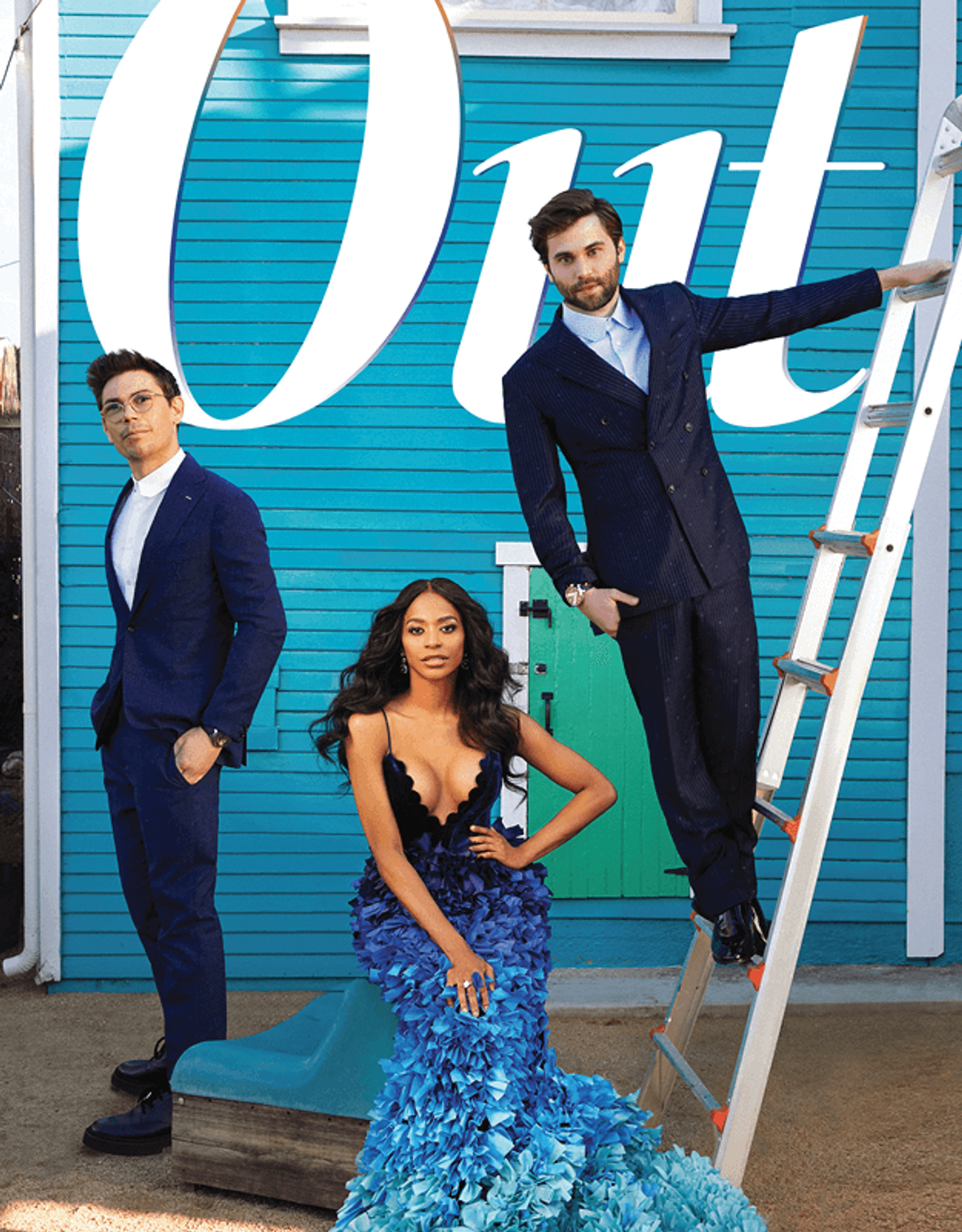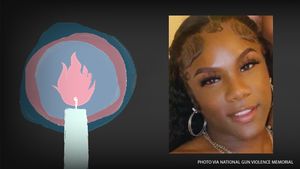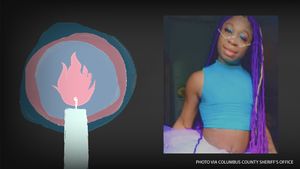Millions of viewers tune in weekly to watch Jake Borelli's character, Dr. Levi Schmitt, save lives on ABC's Grey's Anatomy. In real time, they've witnessed Dr. Schmitt have the first kiss between two male doctors in television history, the first major gay male romance in the show's history, and, of course, give a now famous "pandemic safe" blowjob (while wearing face masks). Simply put, it's great television.
Outside of Grey's, Borelli is blazing trails in other areas. Last year he starred in Freeform's first gay romantic comedy, The Thing About Harry, just before a wave of successful queer rom-coms premiered throughout the holiday season, solidifying his place in queer TV history. Despite the enormous acclaim, it shouldn't be a surprise that, like countless of actors before him, Borelli never thought achieving success in Hollywood would be possible as an out gay man.
Borelli found his tribe early performing at Columbus Children's Theater, a local theater where he appeared in nearly 20 productions in five years. But he was well aware that his favorite shows lacked representation of people like him. For Borelli, who knew he was gay in his early teens, it made him question whether his dreams were even possible.
"I would watch these shows and I fell in love with the characters. I wanted to be on them so badly. I wanted to do what these people were doing and I wanted to tell these stories," says Borelli. "And yet, I also could see clearly that these stories did not involve me at all -- and that was hard."

Above: Sweater by Kidsuper Studios. Pants by Slowear. Boot by Giuseppe.



Shirt by Martin Asbjorn. Sweater and Pant by Coach.
"When you are constantly seeing stories you are not visible in, the message of 'You are different. You don't belong' builds up, and it built up over time," he explains. "It caused me to feel very alone. When I was older and knew that acting was what I wanted to do, knowing that I was gay, I saw a disconnect there. I saw a disconnect of no queer lead characters, no queer characters at all, or queer actors who came out on network television shows and then their careers ended. I was terrified and it caused me to stay in the closet. I knew I was gay and I also knew I wanted to act. I knew those things couldn't go hand in hand. I believed that they couldn't. I convinced myself that they couldn't."
The struggle of being closeted consumed Borelli for nearly a decade as he went back and forth between Los Angeles and New York City, auditioning, sending tapes, and continuing to study his craft. "In hindsight, I regret it," he reflects now about staying closeted. "It made me feel even more alone to not have anyone to confide in and to feel like if I wanted a career, or if I wanted to be successful in the way that I wanted to, I'd have to hide a huge part of myself. It was a struggle for a really long time -- and then I booked Grey's."
Of course, Grey's Anatomy was a hit long before Borelli joined, with a list of milestones for LGBTQ+ characters including Sara Ramirez's bisexual storyline, Jessica Capshaw's lesbian character, Candis Cayne's short but memorable trans storyline, and Alex Landi's character, Dr. Nico Kim, the show's first gay male surgeon whose love story with Dr. Schmitt culminated into what fans now call "SchmiCo" (sounds like "Nico").
Borelli was a fan favorite from the start of his first season, but when showrunner Krista Vernoff approached him about the idea of his Dr. Schmitt coming out of the closet, old traumas came swirling back.
"I was flooded by the terrified feelings I had as a kid, that if I came out of the closet all of what I had built for myself would somehow crumble and I wouldn't ever get to tell the stories I wanted to tell," he says. "To be honest, when [Vernoff] told me she wanted the character to come out, I didn't say yes right away. I was scared of what that might mean for me because I knew what it would mean to all these young queer people who are watching Grey's, like myself, who didn't have a gay male lead on that show to look up to and didn't feel like they were fully 100 percent represented. I knew what it would mean to everybody and what it would mean to me. But I also knew that I would want to come out of the closet and to be open and vulnerable if I was playing a queer character on such a huge show."

Shirt by Christian Wijnants. Jacket and Blazer by Helen Anthony
Borelli did what he knew was best: he called his parents in Ohio. "My dad said one of the most incredible things that I remember to this day," he shares. "He said, 'You know what? Sometimes when you give a voice to something you've been holding in that terrifies you, you feel lighter. You feel freed.' And so, I immediately called Krista back and said, 'Let's do this thing.' And we did."
Borelli came out publicly on Instagram the same night millions of viewers watched Dr. Schmitt come out (in 2018). The response was overwhelmingly positive and as his character's storyline frees viewers weekly, what they don't realize is that it continues to free Borelli as well.
"The fact that it is on a network television show with this scope and the amount of people that we get to tell these stories to is incredible. I can't help but think that had I been able to watch this show when I was younger, it would have caused me to be so much less afraid."

Shirt by Christian Wijnants. Jacket and Blazer by Helen Anthony
Borelli credits showrunners like Vernoff, who handled Dr. Schmitt's coming out story with compassion and thoughtfulness, for helping to carve avenues we desperately need. Moving forward, the actor says it's important to keep our focus on the people at the top rather than placing pressure on the actors, especially if we want to continue making progress for queer representation on television. A perfect example of that, he argues, is the ongong debate about whether straight actors should play queer roles.
"Actors are trained, hopefully, to be able to play something that is not themselves. I think it starts to become a double standard when you say that straight people can't play gay roles, because then the flip side of that double standard is that gay people can't play straight roles -- and I don't think that is correct," he explains. "However, I do think the focus should lie in the tastemakers, in the showrunners, in the casting directors, executives in the business, the people who are creating this content. I think the responsibility lies with them to throw a wider net because at this point, people in privilege, oftentimes straight people, are the ones given the opportunities because they're the ones that have been privileged enough to be in places where the opportunities are."
"It goes back to as a kid, when you don't see a place for yourself," he says. "Oftentimes, that makes it harder to try. It makes it harder to work up the courage to do it. I think in my case, I had a little bit of delusion, a little bit of narcissism, but enough confidence to do it anyway. Even though I was terrified, I did it anyway. I think that's partially why I'm in the position where I'm in now. But without that, or without a vision of yourself or someone to look up to, it becomes very hard to get into that position."
He adds, "Tastemakers need to hire queer people and search harder for queer people, so that a young trans girl in Iowa can see a trans woman on TV and say, 'You know what? I'm going to go study for this. I'm going to go to theater school or I'm going to go to LA and study with some awesome coaches because I see myself up there. I have the courage to do that for myself because there might be a place for me when I finish.'"

On Jake & Ryan: full look and accessories by Louis Vuitton, shoes by Giuseppe. On Alexandra: dress by Annakiki, jewelry by David Yurman.
This feature is part of a three-part cover story of Out's 2021 Hollywood Issue. Jake Borelli is featured on the cover alongside Ryan O'Connell and Alexandra Grey. It is the first print issue under the editorial direction of editor-in-chief David Artavia. The issue is out on newsstands on March 3, 2021. To get your own copy directly, support queer media and subscribe -- or download yours for Amazon, Kindle, Nook, or Apple News +.
Photography by Easton Schirra, assisted by Danya Morrison.
Styled by Aisha Rae with assistants Angel Cross and Tashie Pollard. Makeup by Dillan Pena. Alexandra's hair by Lisa-Marie Powell. Jake and Ryan's grooming by Sonia Lee.
Art Direction by Ben Ward. Shot on location in Boyle Heights. Special thank you to Jake Noonan.































































































